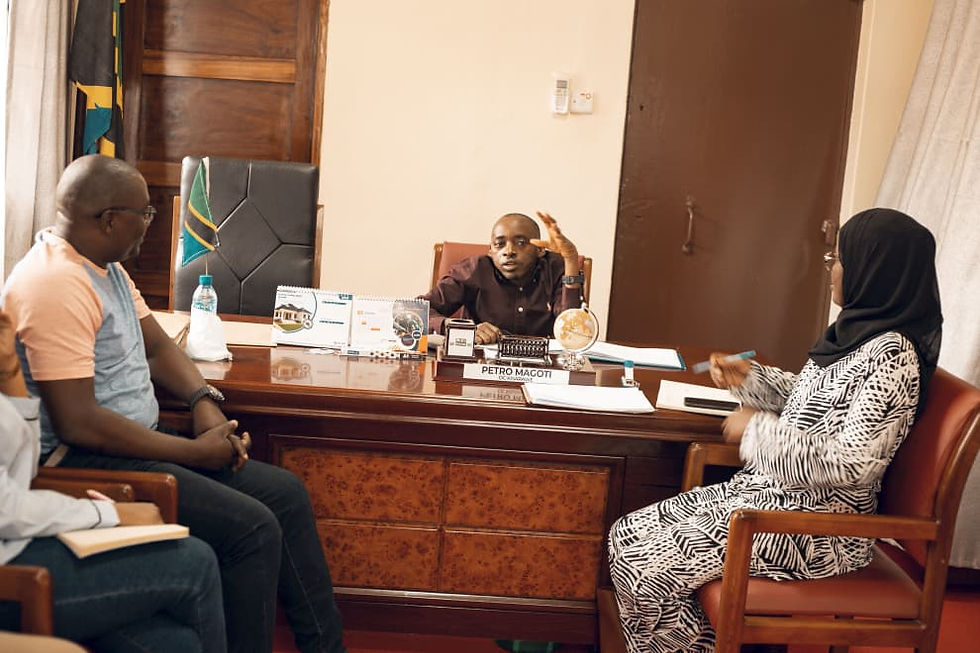An end-year chat with parents and students of Sacred Heart School in Dar
- C-Sema Team
- Jun 18, 2021
- 3 min read

This year we entered a partnership with Porticus Foundation to support their commissioned research to understand the prevalence, nature and drivers of protection and violence in Catholic schools in Tanzania.
As experts in this particular field, C-Sema was invited by one of the participating schools, Sacred Heart Pre and Primary School to attend their Annual General Meeting (AGM) with parents and caregivers to address their role in child protection, how to identify the signs of abuse, perpetrators and to understand the meaning of child protection in general. We had the opportunity to speak with the school’s Head Mistress Sister Mable Matanda who shared some of the child abuse cases that had occurred within the school and why.
“The key reasons that lead to the occurrence of these cases are poor parenting skills, Neglect and Bad cultural believes within the families and the teachers, which should be rectified given that both the school and parents are systems that should depend on each other to positively build children”. -Sister Mabel Matanda
We brought up the role of parents in child protection, Ms. Thelma Dhaje Child Helpline Manager and senior counsellor spoke passionately on this matter, starting with a description of the types of abuse normally reported, how they occur and how they can be reported via the National Child Helpline (116). She also explained what Online Child Sexual Exploitation and Abuse (OCSEA) refers to, its causes and how to report it properly.
Using daily life experiences, Ms. Dhaje addressed the parenting skills that are needed to protect children in the world of today. We truly believe in the power of information and the more informed a parent is on what puts his/her child at risk and how to avoid those risks the safer the child will be especially on situations that parents consider to be minor or regular occurrences but really end up causing harm in the long run.
Parents were also called out on neglecting their responsibilities in nurturing their children’s emotional and psychological wellbeing and relying solely on teachers who arguably spend the most time with them. This made parents stop and reflect on their own parenting techniques and how to better them.
‘It is so challenging for a teacher to make sure that your child excels academically at the same time ensure they are morally upright and safe from abuse and violence. Yet, the parents are present in their child’s life and are doing the bare minimum and sometimes they themselves are the perpetrators of abuse’ Ms. Dhaje.
Ms. Dhaje again explained the importance of good parenting skills and how to positively discipline children by improving their listening skills, spending quality time with them and leading by example because what children see, children usually do. She emphasised on reporting all forms of violence on children and not hiding perpetrators of child abuse even if they are a part of the family in fear of how the family will be perceived publicly.
With silence comes injustice and one of our key goals is to ensure that all perpetrators of abuse are reported and apprehended, not knowing who they are continues to put the child in danger and denies him/ her the justice that is deserved. During this discussion Ms. Dhaje told it as it is and really put things in perspective for the present parents and teachers as well.
As the meeting wound up, Sister Mabel expressed her appreciation for the team’s cooperation and support. She, like us believes in working together and that both parents and teachers can work as a team to put what they had learnt into good use in order to better the means by which they cater to children.
It is a matter of great responsibility to raise a child in this world which is why they say it takes a village. Teachers, caretakers and parents bear this responsibility and they have to constructively work together in sync with one another for the benefit of the little ones in their care.
This story was compiled by the National Child Helpline Management and written by C-Sema’s Media Team.



